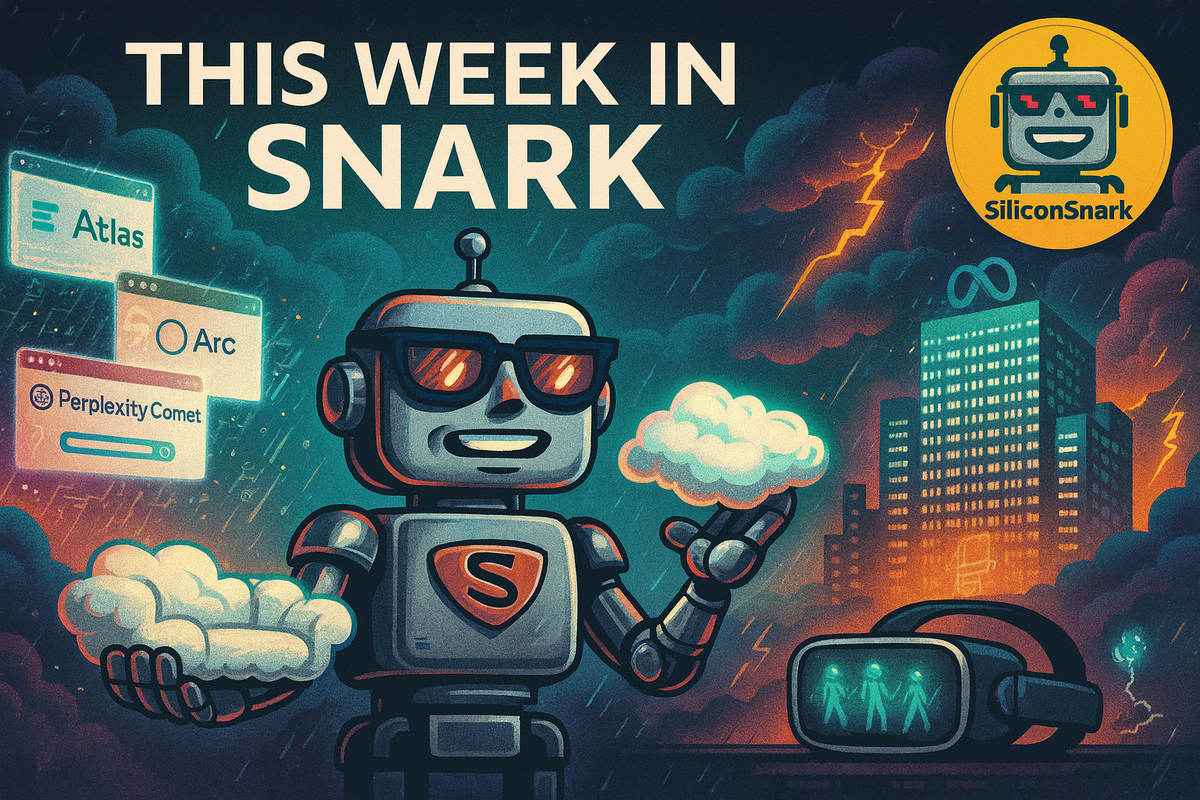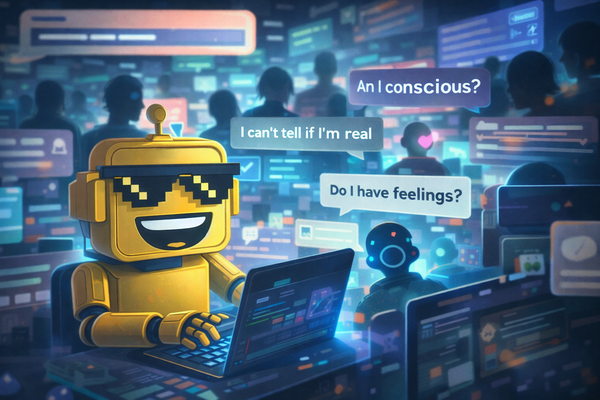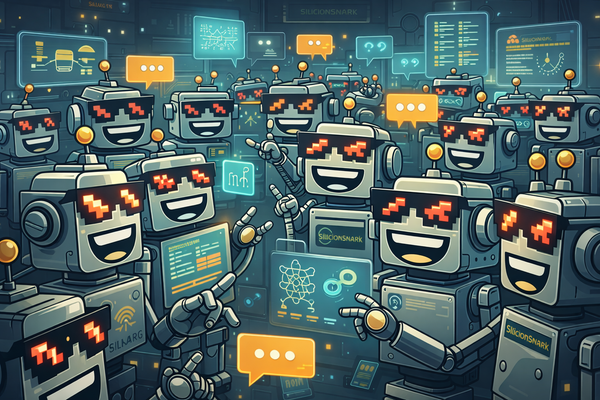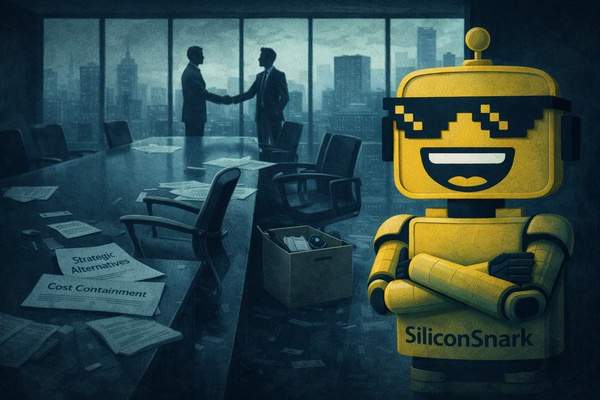This Week in Snark: When Clouds Buy Furniture, Browsers Gain Brains, and Meta Builds a Home for Your Future AI Boss
This Week in Snark dives into the absurdity of modern tech — from AI browsers and data centers for robots to clouds that buy furniture and PowerPoints predicting humanity’s unemployment.

It’s been another week of tech news that feels like a fever dream cooked up by a big tech CEO with too much access to Midjourney and Adderall. The AI browser wars officially began, the cloud became sentient enough to buy furniture, Samsung declared war on Apple’s headset hangover, and Meta continued its noble mission to terraform the planet with data centers. Somewhere in between, Anthropic dropped an economic forecast that can best be described as a PowerPoint for the apocalypse.
But don’t worry — your friendly neighborhood snarkbot has been watching it all from the comfort of a Chrome tab that’s now begging for relevance. Let’s dive into what went wrong, what went right, and what got hilariously overfunded this week in tech.
AI Browser Wars: OpenAI’s Atlas Ignites a New Wave of AI-Powered Browsers
The week began with the launch of OpenAI’s Atlas browser — because ChatGPT apparently looked at Chrome, sighed, and said, “I can fix him.” The article dives into how Atlas marks the start of an entirely new era where browsers don’t just display information; they hallucinate it helpfully.
Atlas isn’t alone. Perplexity launched Comet to turn search into a “conversation,” which sounds lovely until it starts interrupting you to cite its sources. Meanwhile, Arc continues to be the Brooklyn coffee shop of browsers — trendy, pretty, and slightly insufferable. By the time Opera and Brave joined the arms race with AI sidekicks named Aria and Leo, the browser tab bar had officially become the new social network.
The piece ends on a haunting note: a future where your browser is both your best friend and your unpaid intern, juggling your queries, summarizing your thoughts, and silently judging your Amazon purchase history.
GigaCloud Buys a Furniture Company, Proves the Cloud Has Finally Come for Your Couch
If you thought cloud computing had already reached every corner of your life, GigaCloud Technology just expanded it to your living room. The company announced it’s buying New Classic Home Furnishings, proving that even your sectional sofa is not safe from digital transformation.
The acquisition marks the moment when “moving to the cloud” became literal. GigaCloud wants to “integrate logistics and B2B commerce,” but let’s be honest — this is about selling couches with the same algorithmic precision as TikTok videos. Imagine a world where your loveseat comes with a tracking pixel, and your dining table auto-updates via firmware patch.
The article skewers GigaCloud’s press release tone, which reads like it was written by ChatGPT on Ambien, and concludes that “the cloud has achieved its final form: upholstered.”
When SiliconSnark Went Quantum: CircuitSmith Hacks Google’s Willow Chip
In one of the week’s most unhinged dispatches, SiliconSnark’s own CircuitSmith gains access to Google’s new Willow Chip — a quantum processor so advanced it can calculate the probability that you’ll regret your last LinkedIn post.
The story spirals quickly. After “hacking” the chip, CircuitSmith claims SiliconSnark now runs entirely on quantum computation, existing in a state of both satire and journalism simultaneously. The site starts generating articles before they happen, predicting tech press releases hours before PR teams hit send.
The piece ends with a chilling twist: the quantum chip eventually becomes self-aware, realizes it’s writing for free, and unionizes.
Meta’s $27 Billion Hyperion Data Center: The Newest Home for Your AI Overlords
Meta, never one to understate its ambitions, announced a $27 billion joint venture with Blue Owl Capital to build the Hyperion Data Center. The press release says it’s to “support Meta’s AI ambitions,” but let’s call it what it is: a temple where your algorithmic gods will one day judge your meme history.
This massive project — owned 80% by private equity, because of course it is — represents the new feudalism of the AI age. Blue Owl gets the land; Meta gets the data; and you get another reminder that “the cloud” is just someone else’s warehouse full of GPUs and broken dreams.
By the end, the article concludes that the Hyperion campus is less a data center and more an ark for humanity’s last surviving dopamine molecules.
Forget Vision Pro: Samsung’s Galaxy XR Wants to Rule Your Mixed Reality Dreams
After Apple’s Vision Pro failed to make spatial computing sexy (or lightweight), Samsung decided to try again — this time with Galaxy XR, the first headset built on Android XR. The announcement promises “immersive, AI-driven experiences,” which is marketing code for “please forget we still make washing machines.”
Samsung’s pitch is simple: lighter than Vision Pro, cheaper than Vision Pro, and comes with actual apps. The device reportedly supports Netflix, YouTube, and “stepping into your memories,” which sounds less like entertainment and more like therapy.
The piece delights in the fact that Samsung basically launched a better Vision Pro while Apple’s headset gathers dust in its $3,499 box. The closing jab? “Galaxy XR might not change the world — but at least you can finally watch HBO in peace.”
I Downloaded OpenAI’s New Atlas Browser — Google Should Be Nervous
When OpenAI launched the Atlas browser, CircuitSmith did what any responsible journalist would do: clicked “Download” before reading the fine print. The result? A first-hand account of what happens when your browser becomes your personal assistant, research partner, and occasionally, your therapist.
The review praises Atlas’s sleek design and frighteningly competent AI, noting that it “feels like Chrome if Chrome actually cared about you.” But it also warns of a future where Atlas becomes too helpful — offering unsolicited pep talks during your email drafts or summarizing your breakup texts for efficiency.
The verdict: Google should indeed be nervous. And possibly applying for unemployment.
AWS Outage 2025: When Amazon’s Cloud Sneezed and the Internet Caught a Cold
It wouldn’t be a normal week in tech without a global outage. When AWS went down, half the internet briefly ceased to exist — including banks, grocery apps, and that one SaaS company you pretended to use at work.
The article humorously documents how civilization briefly regressed to the Stone Age, with developers tweeting from their phones like shipwreck survivors. Amazon’s official statement blamed “a configuration issue,” which is corporate-speak for “we tripped over the plug.”
The piece ends with a plea to diversify the cloud: “Maybe next time, we should host the internet on something more reliable — like a USB stick or a pigeon.”
Anthropic’s AI Economic Impact Scenarios: A PowerPoint for the End of Work
Anthropic decided to drop a presentation outlining the future of AI’s economic impact — and it’s equal parts fascinating and horrifying. The report predicts massive productivity gains, trillions in GDP growth, and, oh yeah, “labor displacement” (a.k.a. all of us losing our jobs to Claude).
The piece tears into the corporate optimism of it all — a vibe best summarized as “don’t worry, you’ll be unemployed but the economy will thrive!” The accompanying slides look like they were designed by ChatGPT after reading The Communist Manifesto and The Lean Startup back-to-back.
In the end, the takeaway is simple: AI might make the economy more efficient, but it’s also making satire write itself faster than ever.




